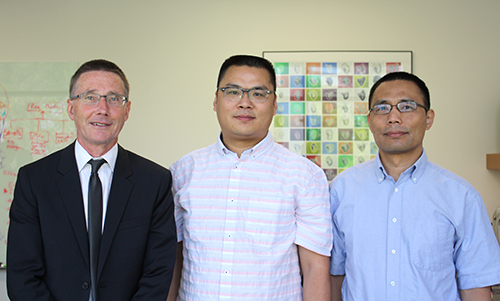
Chinese businessman Yong Chen has pledged $1 million to USC stem cell researcher Qi-Long Ying to support his future “eureka moments.”
“When I talked to Mr. Chen, I told him that groundbreaking discoveries often come from unexpected directions,” said Ying, associate professor of stem cell biology and regenerative medicine at the Eli and Edythe Broad Center for Regenerative Medicine and Stem Cell Research at USC. “You suddenly have a very creative and unusual idea, and you test it. And it works.”
Ying and a team of researchers had one such moment — which ranked among Science magazine’s “Top 10 Breakthroughs of 2010” — when they used embryonic stem cell-based technology to produce the world’s first “knockout” rats, laboratory animals modified to lack one or more genes. Knockout rats allow scientists to model and study a wide range of genetic diseases that also occur in humans.
Chen’s gift will support at least three previously unfunded projects: deriving embryonic stem cells from other species, understanding how normal embryonic stem cells become tumor cells, and maintaining and genetically modifying blood-forming stem cells to potentially cure diseases such as HIV and leukemia. In recognition, Ying’s lab will be named the Yong Chen Stem Cell Research Lab.
“Gifts such as the one given by Mr. Chen allow our researchers to voyage into the most unexplored realms of scientific innovation and creative problem-solving,” said Andrew P. McMahon, director the Eli and Edythe Broad Center for Regenerative Medicine and Stem Cell Research. “By supporting bold new directions in today’s stem cell research, Mr. Chen is making an important investment in developing tomorrow’s stem cell cures.”
Carmen A. Puliafito, dean of the Keck School of Medicine of USC, added, “Mr. Chen’s investment in stem cell research will accelerate the pace of scientific discovery. It is through gifts like these that we will transform the future of medicine and eventually develop new treatments for the patients who need them the most.”
Chen and Ying, who first met in February 2013 at USC, realized that they shared a common philosophy that led to their success.
“If you want to achieve big, you first have to think big,” said Chen, who has had his share of breakthroughs in business as the owner of the Zhongmei Group. “I’m delighted to support Dr. Ying’s research because of his impressive track record of past success and his ambitious vision for future discovery.”
The group, which owns several hospitals and specialty centers in China, promotes medical education, training, investment, research and development. It is currently partnering with several U.S.-based institutions to further advance medical care, research and education.
